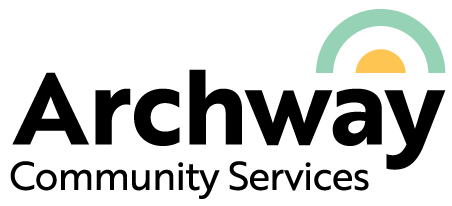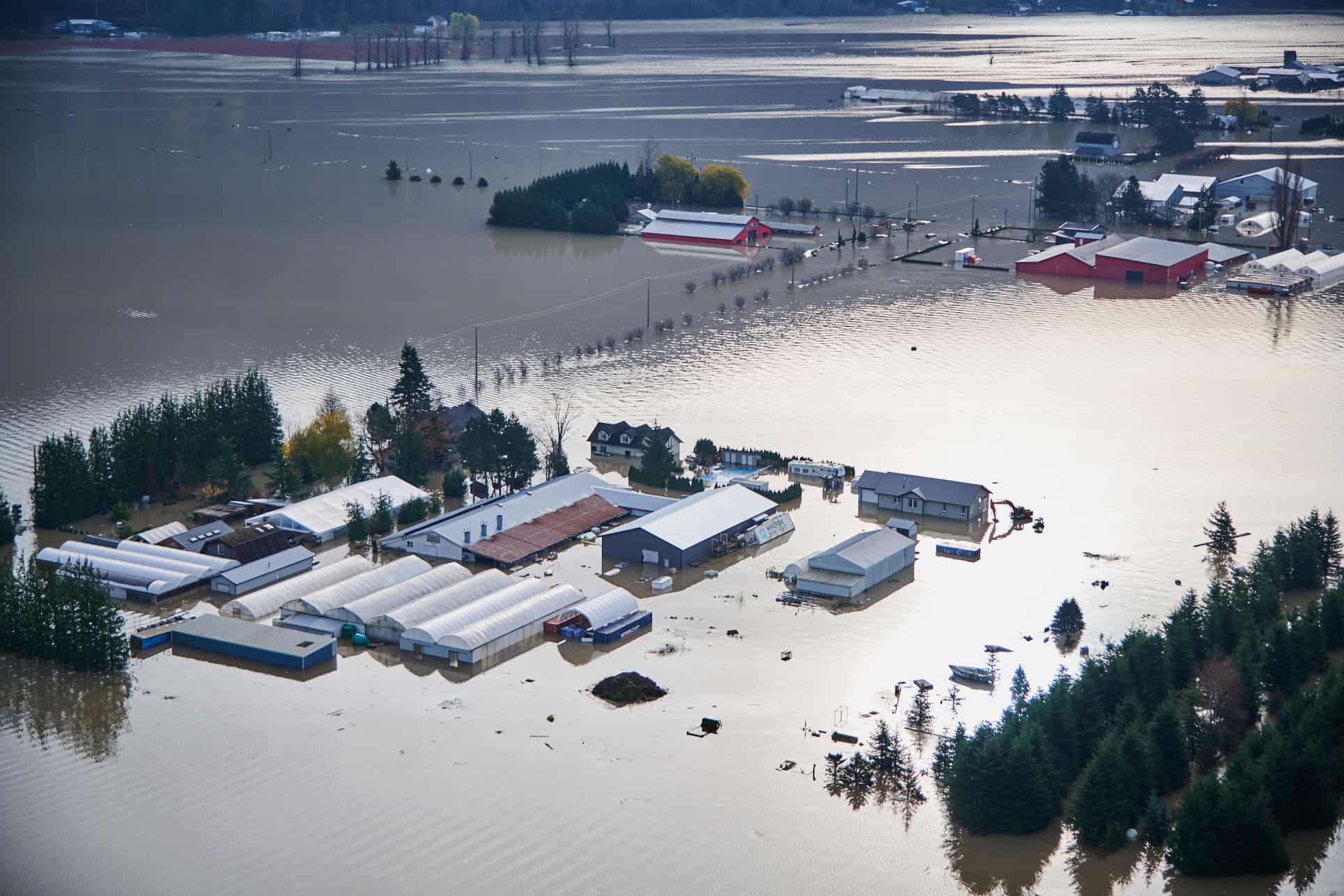
Photo Credit: Abbotsford Police Department
When the Sumas Prairie flooded, hundreds of temporary foreign workers on farms were displaced. Not only did many lose their housing and belongings, their employment and ability to remain in Canada was at risk.
It was a chaotic time. Some workers were out in the fields when the evacuation call came and didn’t even have time to gather any clothing or personal belongings. Workers were evacuated to other farms, camps and the emergency shelter at Tradex.
Workers immediately began contacting the staff in the Archway Legal Advocacy for Agricultural Workers program for assistance.
For over 20 years, legal advocates in the program have helped local agricultural workers and temporary foreign workers with employment, tenancy, and disability issues and have existing relationships with most migrant farmworkers within Abbotsford and the Fraser Valley.
Jose, one of the temporary foreign workers recalls that the team “immediately responded to our call, listening to our concerns, and explaining our rights and responsibilities. At that moment when the water began to rise, and everything happened so fast, it was difficult for me to understand what was happening, even more so because everything was in English. Truly for me and my co-workers, you are our angels who always help us.”*
While workers were contacting the legal advocates, community members were also reaching out with offers of help.
Staff began gathering culturally appropriate food for workers from the Archway Food Bank and other organizations.
In the first week, the four staff members provided support to 137 men and 15 women who were affected by the flooding. Within the first three weeks, they supported 380 workers with various benefits, food and warm clothing.
“It was a very hectic time,” said Claudia Stoehr, the Spanish legal advocate.
“It was so sudden and on such a large scale. There was so much uncertainty and the workers and farmers were watching their livelihoods disappear.”
Program staff worked with several organizations including the BC chapter of the Global Network MX, Progressive Intercultural Community Services, Solid Rock Church, Vancouver, Port Moody, Squamish and New West Farmers Market, Mandair Farms, volunteers, and the Mexican community in Vancouver to provide mental and physical support to support the ongoing needs.
Staff were also invited to join the United Way table at the Emergency Shelter housed at Tradex. They assisted temporary foreign workers staying there, provided translation and supplied items like clothes, pillows, blankets and towels.
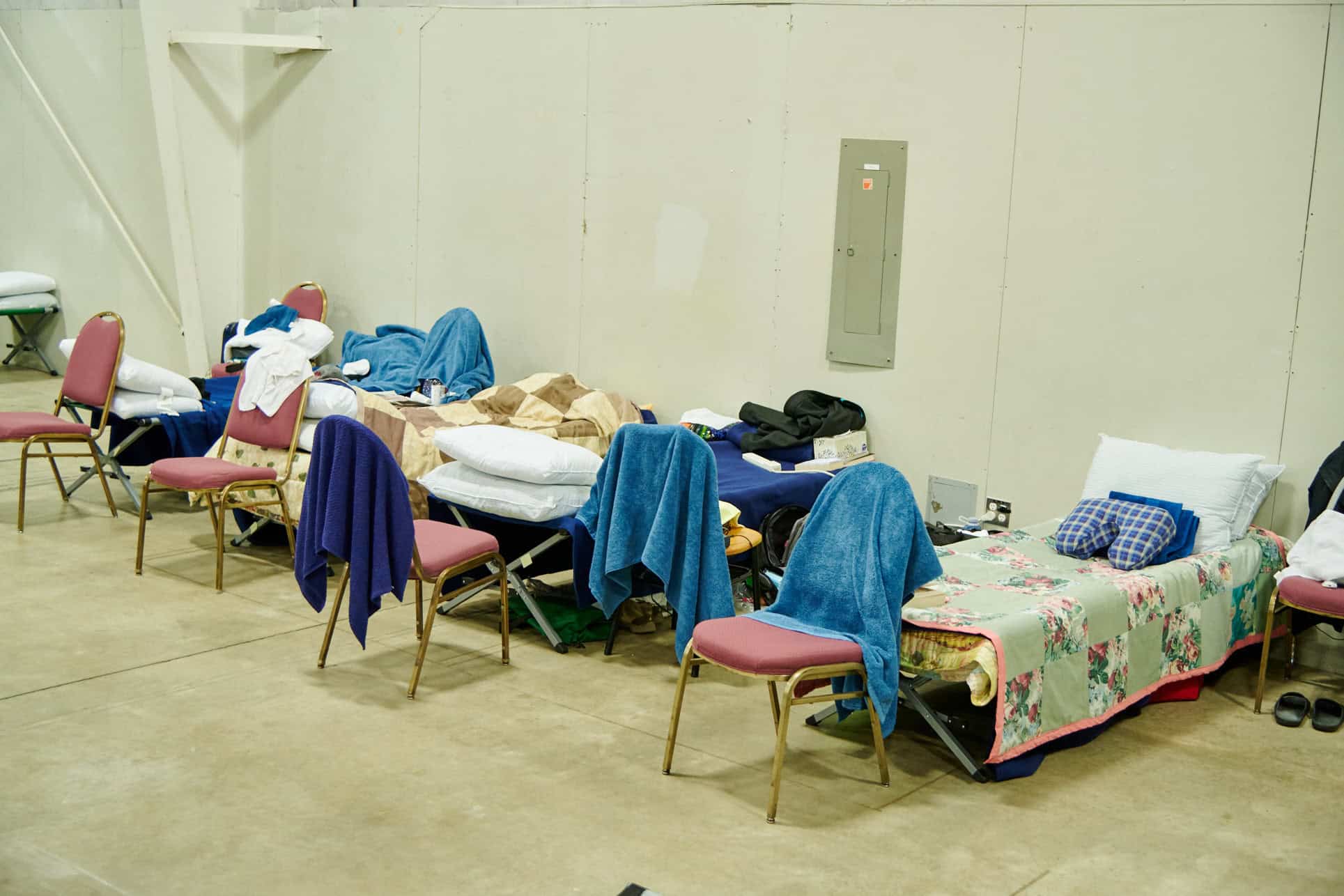
Inside the Emergency Shelter at Tradex
“I want to thank every person in the community who helped me in that moment of difficulty when the floods were last year. Because without you, I would not have known what to do at that time, everything was chaos and confusion. God, or whoever you believe in, bless every generous human being.”*
Financial Assistance
Within a week of the flooding, the provincial government announced financial assistance would be quickly available through the Red Cross. Eligible households could apply for $2,000 to meet their immediate needs.
Unfortunately for the temporary foreign workers, only one grant was available per household. Archway advocates along with other agencies contacted the Red Cross to explain that that some farms in the flood areas housed dozens of workers. The eligibility requirements were expanded to include these situations. Hundreds of temporary agricultural workers were able to access and obtain this aid which was very timely as some were sent back to their countries of origin and lost their wages.
Some individuals were unaware of the financial aid offered or didn’t have a chance to apply before heading home. After more conversations with the Red Cross, those now living outside of Canada were allowed to apply for the aid.
In order to receive the money, many workers had to set up online banking which legal advocates helped them with.
“It’s understandable that a program of this scale needed to be rolled out quickly. However, some people got left out due to communication issues, or didn’t know who to contact so they weren’t able to access the assistance when it was most needed,” said Gurcharan Dhillon, the supervisor of the Legal Advocacy for Agricultural Workers program.
“When providing emergency relief, we must consider what barriers people have and find ways to help the most vulnerable and those without access to technology or transportation.”
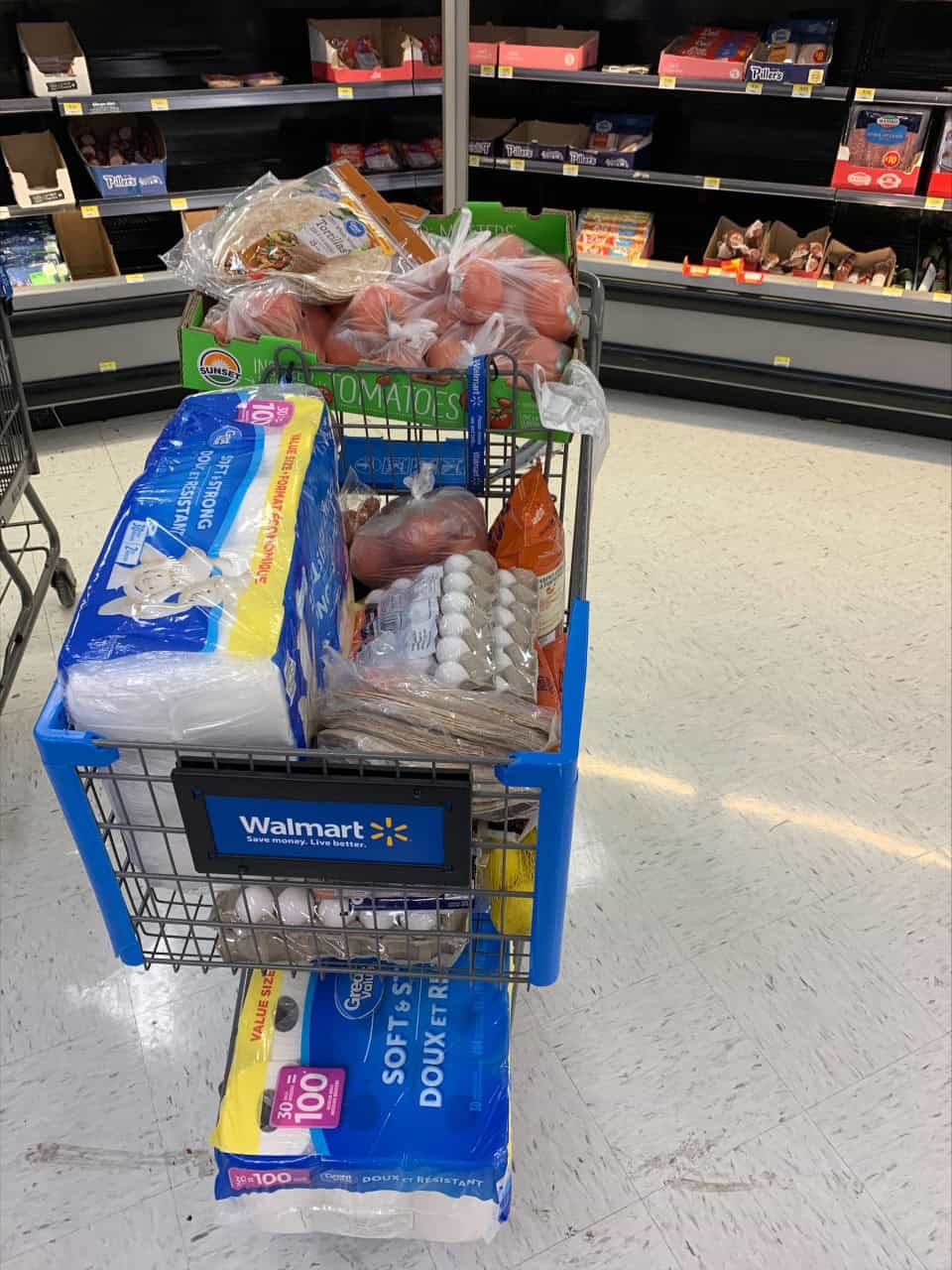
Some of the groceries purchased for displaced farmworkers.
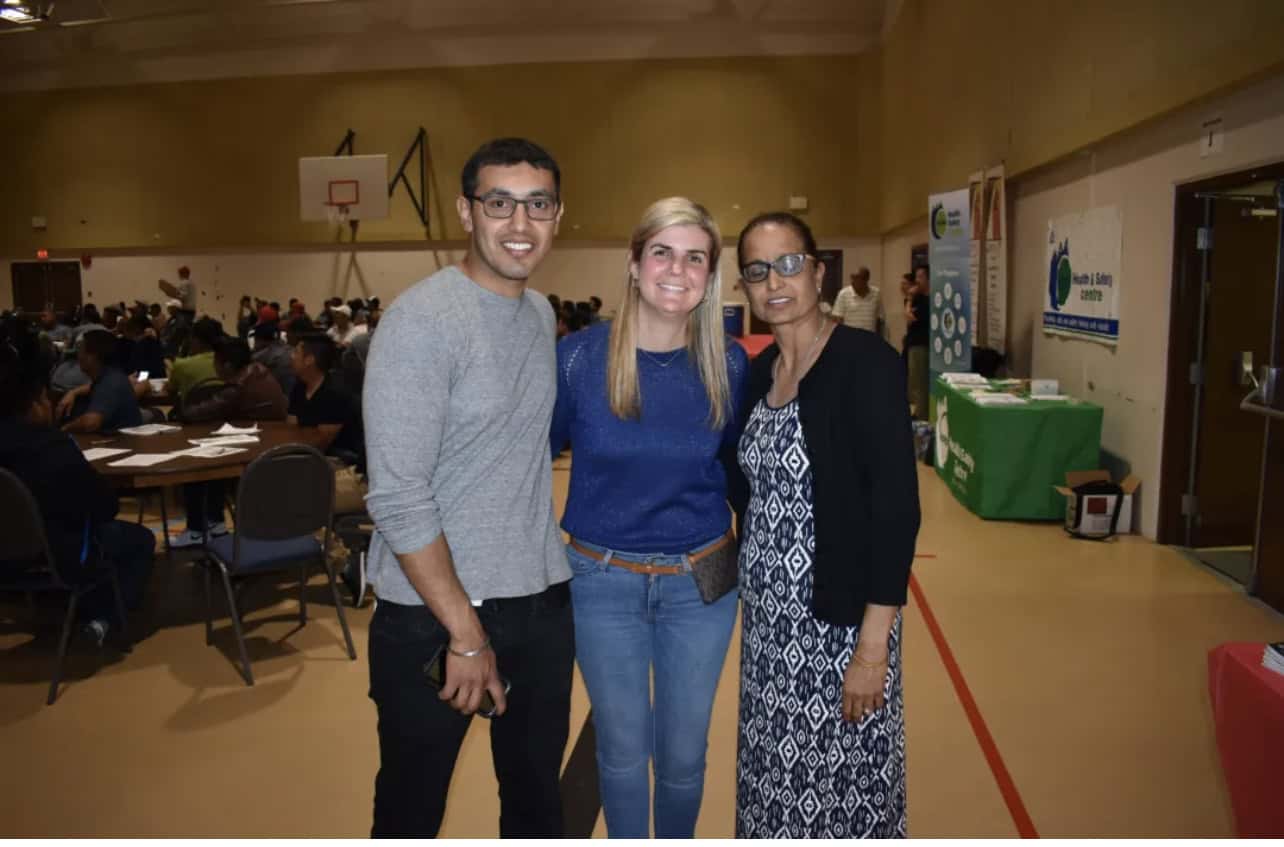
Legal Advocates – Sarb, Claudia and Gurcharan
Employment Assistance
Temporary Foreign Workers have their work permit tied to their employer and are not allowed to switch employers without approval.
This system can leave employees stuck with an unethical employer and can make them afraid to speak up. Despite advocacy long before and after the flooding, this has remained unchanged.
Since they were not legally entitled to work at any other company, it meant that many employees were out of a job and had to return home.
Claudia estimates that 70 – 80% of the affected temporary foreign workers left Canada earlier than planned.
Most of the temporary foreign agricultural workers in Abbotsford come from Mexico, Guatemala and Philippines. Almost all of the workers use their income to support their families back at home.
Temporary foreign workers are eligible for employment insurance (EI) but obtaining it can be difficult. Not all employees were able to receive proper records of employment from their employers. After the flooding, Legal advocates reached out to the employers and Employment Insurance to help mediate.
Enrique P was one of the workers who was able to receive EI. “I appreciated this valuable and quick help because this is the only money with which I support myself and send to Mexico so that my family can have the basics for their needs.”
“Without the help of the program, it would not have been possible for me to apply for Employment Insurance, because I do not have a computer, I do not speak English and I do not know the requirements for this application.”*
Applying for the EI was further complicated after employees had returned home. Months later, advocates were able to clarify that workers no longer living in Canada were still eligible for the benefits they had paid into and assisted workers in applying.
While most employees returned the following spring not all farms are operating at full capacity yet due to the flood damage. Advocates continue to support farmworkers in replacing items lost in the flood and recently Archway arranged for some air conditioners to help farm workers with the summer heat wave.
“Without the help of the program, it would not have been possible for me to apply for Employment Insurance, because I do not have a computer, I do not speak English and I do not know the requirements for this application.”*
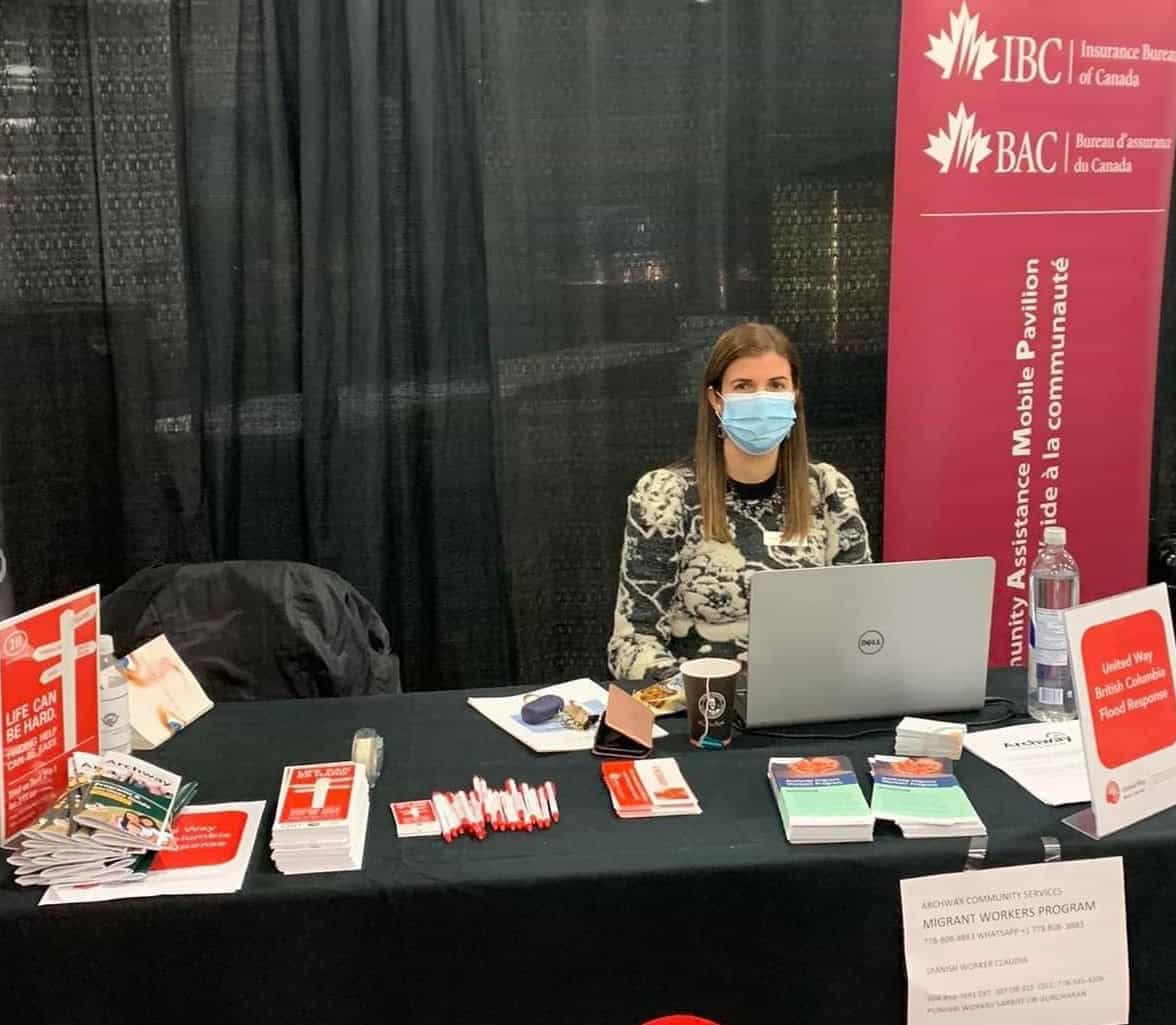
Claudia at the United Way table at the Tradex Emergency Shelter
Planning Ahead
Some of the donations raised have gone towards prevention work for future disasters. During the flood it was observed that many farmworkers were unclear of evacuation procedures and necessary safety protocols.
To date, 60 workers have been given first aid training and emergency preparedness tips in full day workshops organized by the non-profit organization Watari in partnership with the BCFED Health and Safety Centre, Migrant Workers Emergency Paramedics Group, Sanctuary Health, Migrant Rights Network, Archway and St. Ann’s Catholic Church.
To help support worker safety, Archway provided the grocery gift cards distributed to workers attending the workshops. The gift cards help compensate workers for their time on the Sunday sessions, which for many is their only day off in a week. Individuals were also given a culturally appropriate lunch and backpacks full of first aid products, hydrating drinks and nutrition bars.
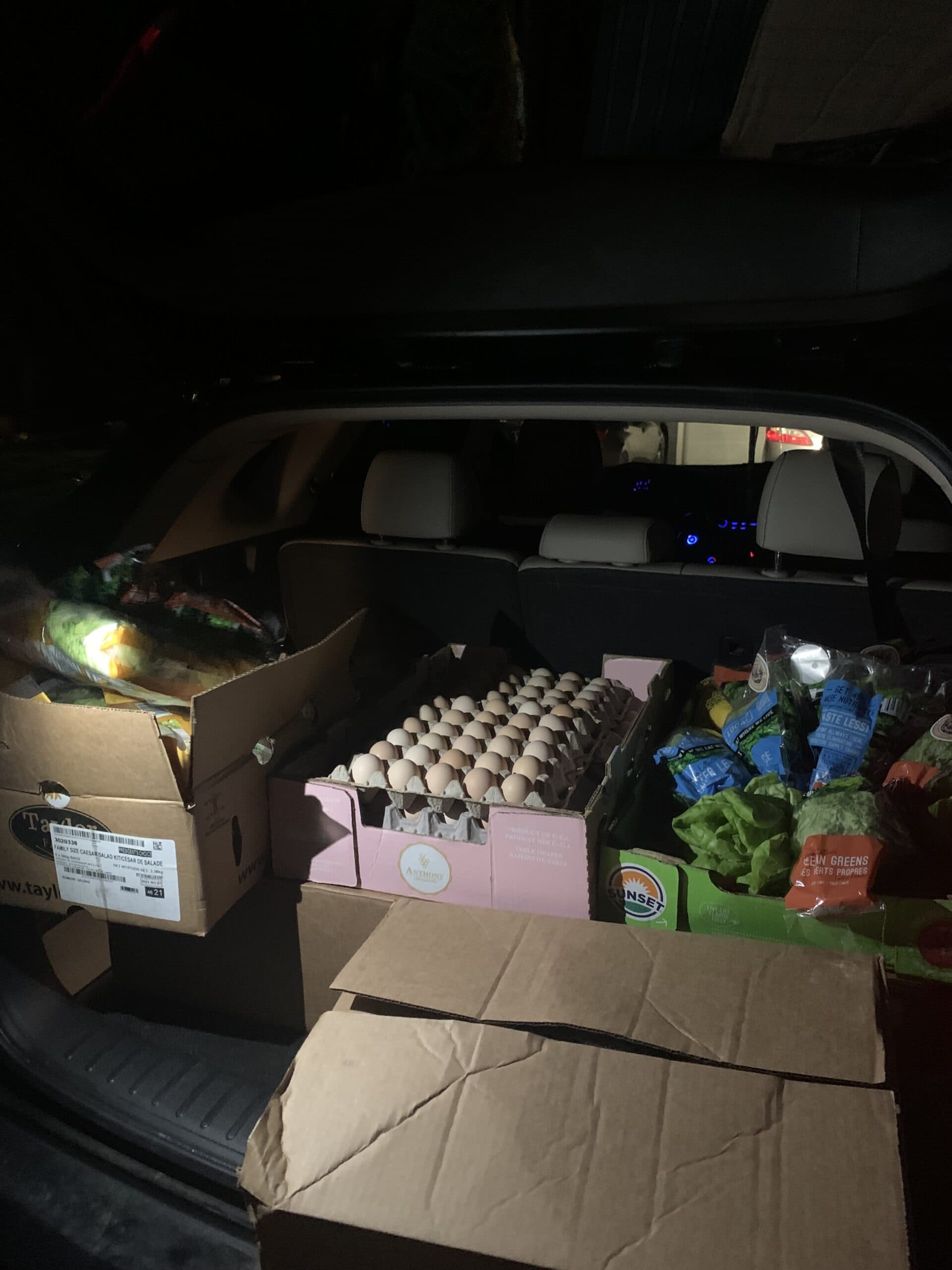
Some of the food distributed during the flooding.
In the Future
Staff in the Legal Advocacy for Agricultural Workers program continue to assist workers as needed and provide education to both employees and employers. They also continue to advocate for law reform to ensure workers are treated fairly.
Advocates would love to see a pathway to citizenship for temporary foreign workers and their families.
“They contribute so much to our society but aren’t able to fully participate and they’re separated from their families most of the year,” said Claudia.
“Many of them have been working here for decades and would love to bring their families over to experience the Canadian dream.”
The legal advocates are grateful to the community for their support. “We’ve consistently seen how generous our community is – from the farmworkers fire in 2018 to the flooding in 2021,” said Claudia.
Enrique V also shared a thank-you message. “I want to thank every person in the community who helped me in that moment of difficulty when the floods were last year. Because without you, I would not have known what to do at that time, everything was chaos and confusion. God, or whoever you believe in, bless every generous human being.”*
*Quotes have been translated from Spanish
